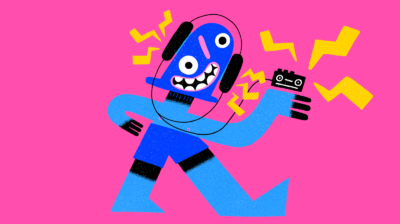What to do about debt
There are ways out of debt
Written by Evelyn Coffin
Voices - Advice
Young people share advice based on their experiences.

When you’re in debt, it really can feel like there’s no way out: as soon as you pay one debt off, there’s another one piling up. Things like credit cards, student loans, home or car loans, and even money borrowed from friends and family are necessary parts of life, but they can easily get away from you and get you in trouble. It happens all the time; you’re not a failure if you find yourself in debt, but you do want to get out of it. It won’t just go away, and it’s definitely best to deal with debt sooner rather than later. Here are a few things to do if you want to sort out your debts.
Commit
Getting out of debt will take some work, and you might need to work hard at it. This may also mean doing your best to save money, or working extra. Just remember that it’ll be worth it to be debt-free. It’s also really easy to try to accept debt as a part of life, and try to ignore it, but you don’t have to! Lots of people are in debt, but lots of people have gotten out of debt, too. Some tips for while you get it sorted:
- Don’t get into more debt while you figure it out. Try not to use your credit cards, borrow any more money, or make big purchases, at least temporarily.
- Sell things you don’t use. We don’t use a lot of the stuff we own, and selling things online can be a great way to bring in a little extra cash.
- Save as much as you can.
- Work as much as you can.
- Hang in there!
Make a list of what you owe
To start off, make a list of who you owe and what you owe them. Use the current balances, and include names and addresses of the creditors, and account or reference numbers. If you can, gather the original loan agreements that you signed in the beginning, too. It can also help to mark due dates on a calendar.
Prioritize
Figure out which debts are more important, and try and pay those off first. Debts are usually sorted into “priority” and “non-priority” debts, and it’s important that the priority ones get paid off first, or there could be more serious consequences.
Examples of priority debts are:
- mortgage and rent arrears
- gas or electric arrears
- TV license arrears
- income tax arrears
- court fines
Arrears are more urgent because it means that one or more payments have already been missed, and the services that they’re paying for (your home, gas, electricity, etc.) could be taken or shut off.
Examples of non-priority debts are:
- credit card debts
- student loans
- water and sewage service charges
- money borrowed from friends or family
It’s important to be honest about which debts are really priorities and which ones just seem more urgent, because you may have to explain to your creditor why you’re paying another debt off first or faster.
Furthermore, it’s a good idea to pay off debts with higher interest rates first, even if those debts are actually smaller. Interest is what hurts you in the long run, so get rid of those high interests, and the sooner the better.
Make a budget
After you’ve got your list of everything that you owe, you should make a list of expenses, so that you can see how much you can start to pay off. A lot of sites offer online budgeting tools that could help you as well. Your budget should include:
Your income: all the money you take in. Include things like:
- Wages
- Tax benefits
- Contributions from your family
Your expenses. Be honest, and include:
- Housing (mortgage, rent)
- Housekeeping (food, transportation, toiletries, cigarettes; anything you buy day-to-day)
- Gas, electricity, and water bills
- Phone bills
- Insurance
- Clothes
- Any other important expenses, such as dental or medical, emergency money, etc.
After this you should assess your budget to see if there’s anything that you can cut back on or do without. Sometimes, creditors ask you to explain why you spend an amount on a certain activity (often things like telephone costs, more than one car, etc.), and you’ll need to be able to justify it if it’s important to you. And, if it’s not that important, you can start saving money by just cutting it out.
Keep in good contact with your creditors
If they don’t know you’re struggling, they might just assume you just don’t feel like paying your bills, and try to take action. In many cases, if you simply contact your creditor and let them know that you’re having trouble they’ll work with you to figure it out. There are also ways to negotiate with them that could help you.
Ask them to lower your interest rates
If you still have good credit, it’s possible to have your interest rates lowered if you just contact the company and ask. Worst-case, they say no; best-case, they say yes, and you save that much money per month.
Ask them to freeze your interest
This means that, in the time it takes to get sorted, you won’t pay any interest or charges. You should also ask if they can put any actions they may take—like going to court—on hold until you’ve got a plan.
Ask for more time
If it’s only a matter of time, call your creditor and let them know you’re in a tough spot, but that you’re making arrangements to pay the bills. Ask for more time (14-28 days is standard) in which to pay them or in which to get more advice. In the meantime, try to make at least the regular minimum payment. This time can be enough to help you get sorted.
Ask to suspend payments
If you really don’t have any money, ask if you can stop making payments for a short time, maybe three to six months. Be able to explain why, such as illness, or you’re looking for a job. This is only a temporary solution, but it can help you get on your feet.
Stay in close contact
Try to contact them by phone, as it’s faster, but also be sure to read everything they send you, and respond to it quickly. Similarly, make sure they’re responding to you in a timely manner, too. Make note of any telephone calls, the name of the person you spoke to, and what you agreed upon. If someone you’re talking to isn’t being helpful, ask for someone more senior.
Get advice
Even simple pieces of advice can help you out, and it’s okay to ask if you need it. You can find a lot more advice at your local Citizens Advice Bureau: https://www.citizensadvice.org.uk/
Don’t panic
Debt can sometimes feel smothering, but it’s important not to ignore it, or put it off, or try to hide from it. Staying calm and organized can make a real difference. If you set goals, stick to them, and work hard, you can pay off any debts you owe in time.






